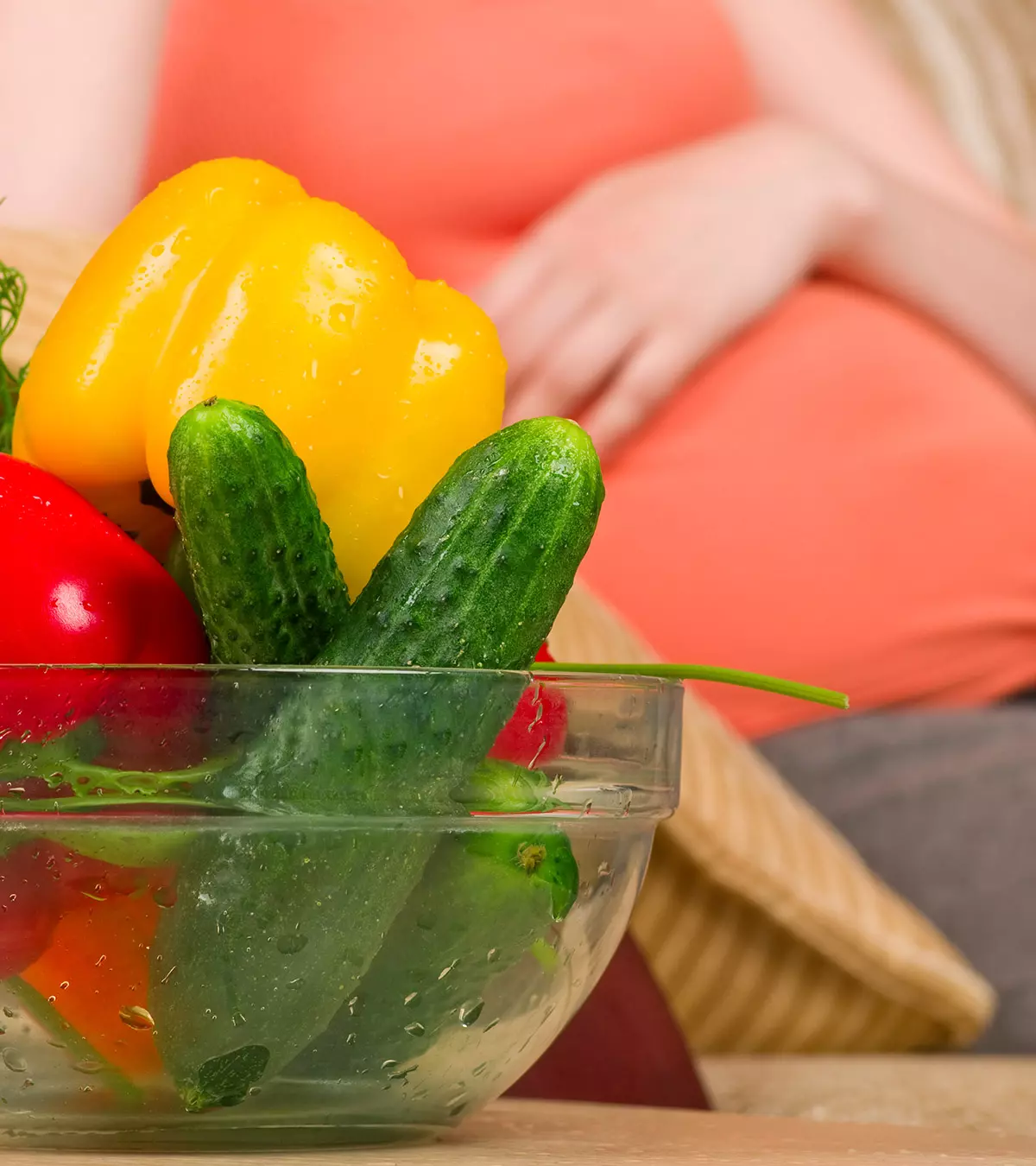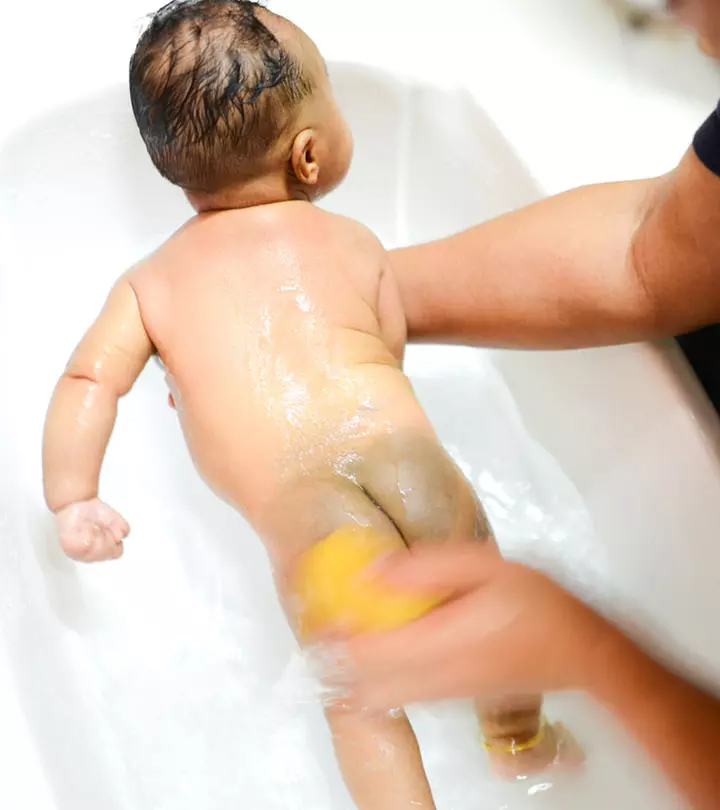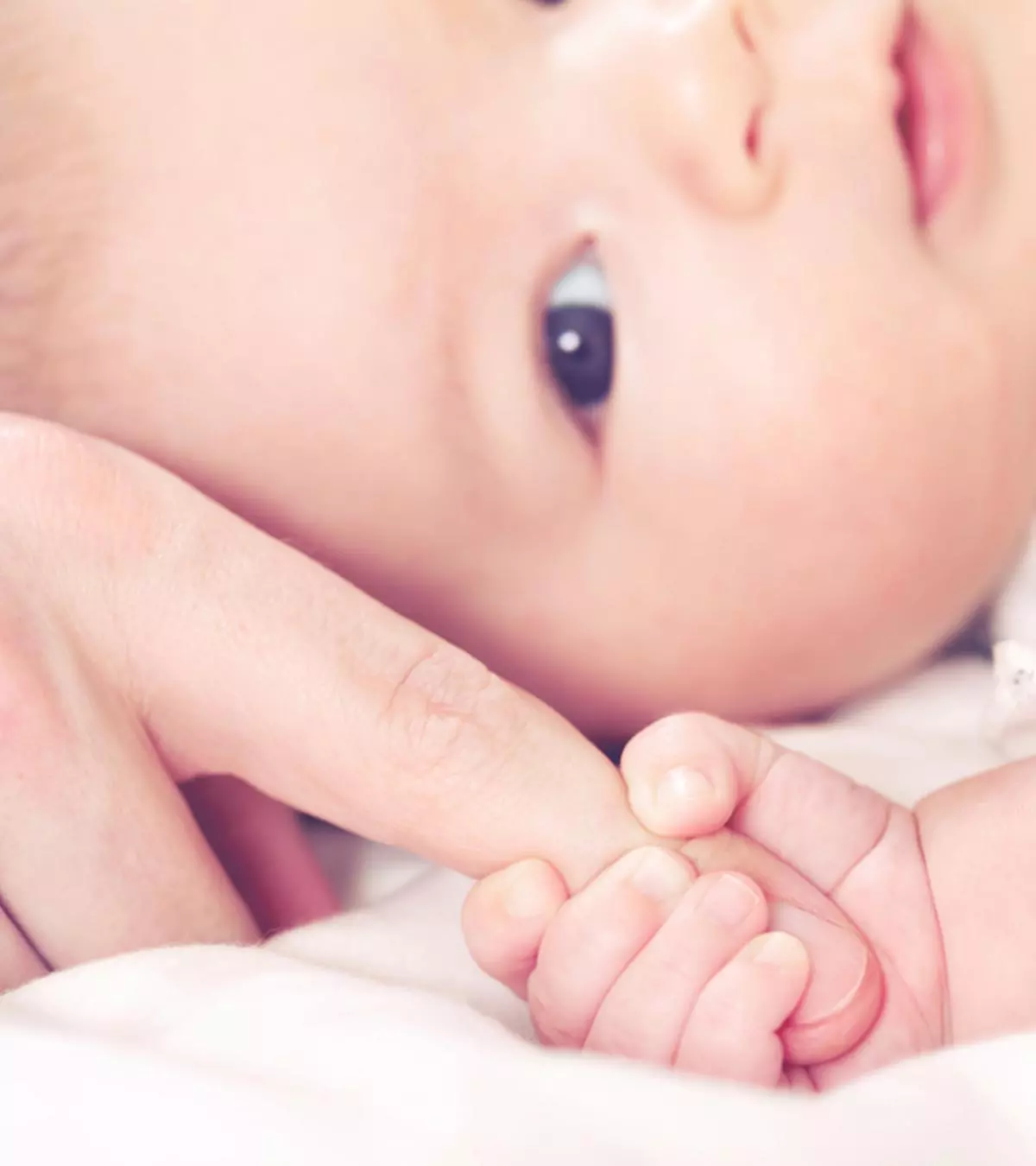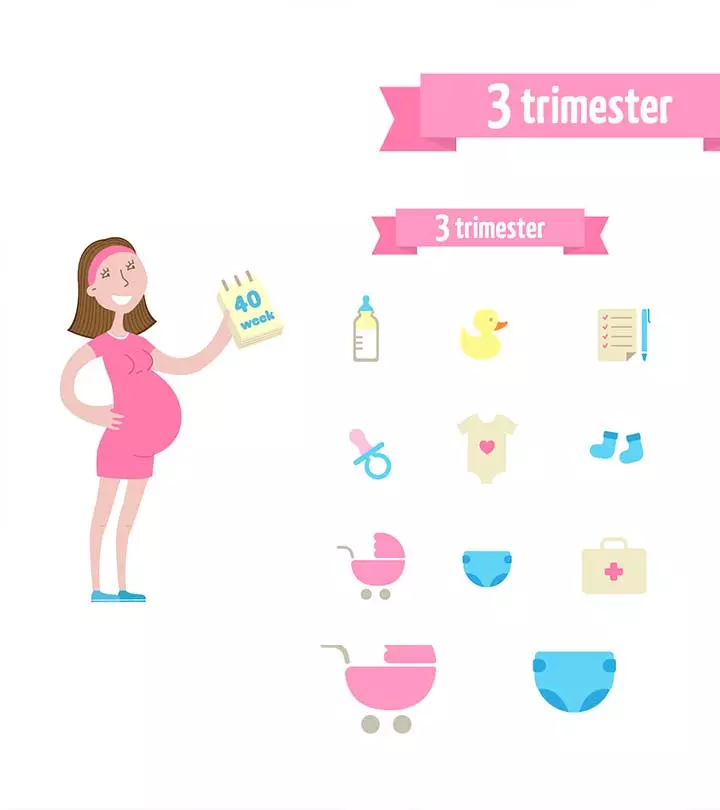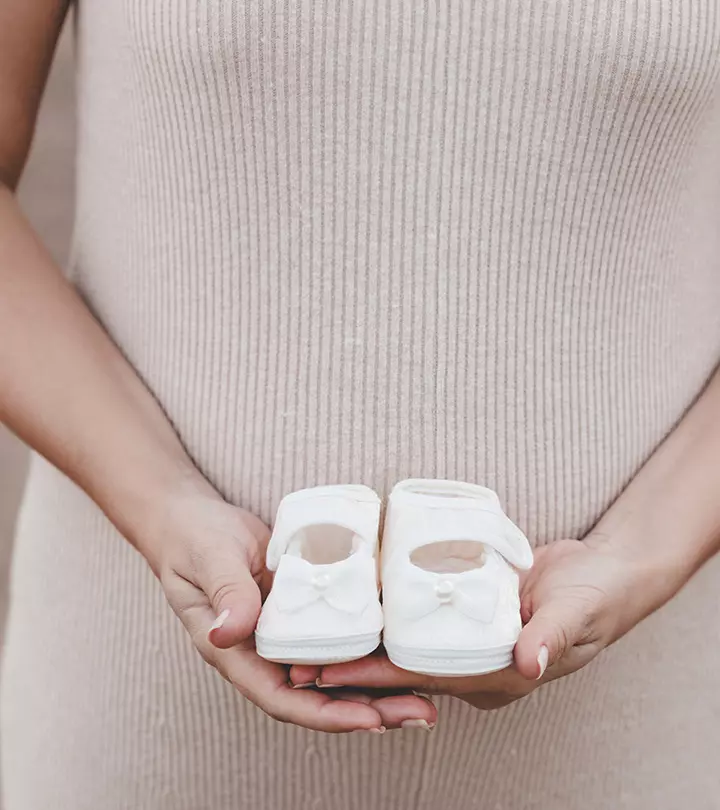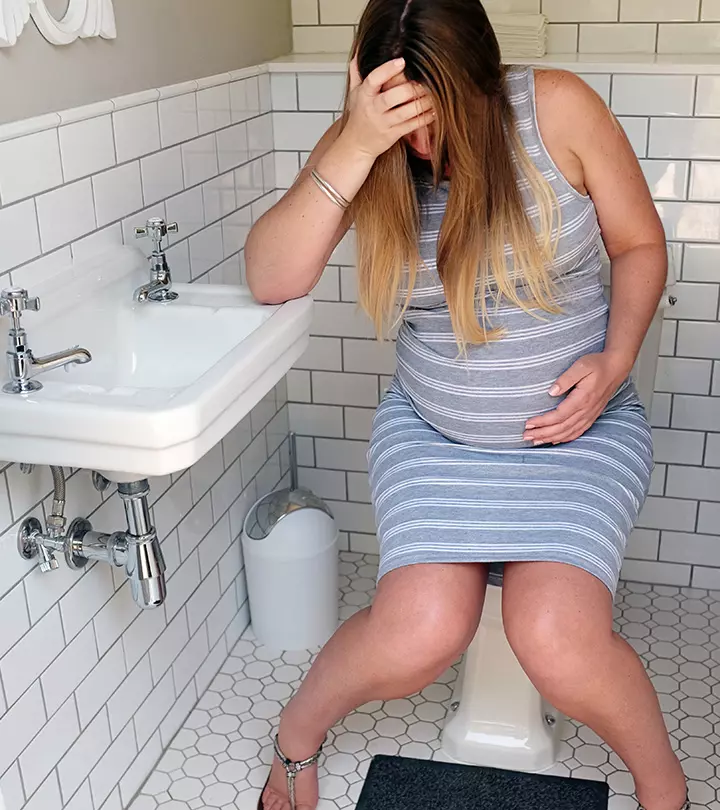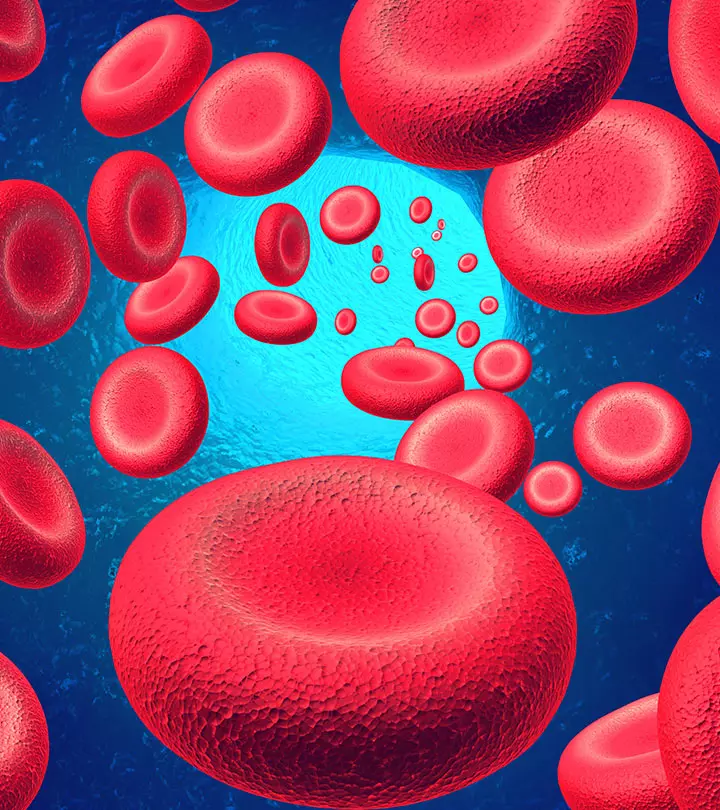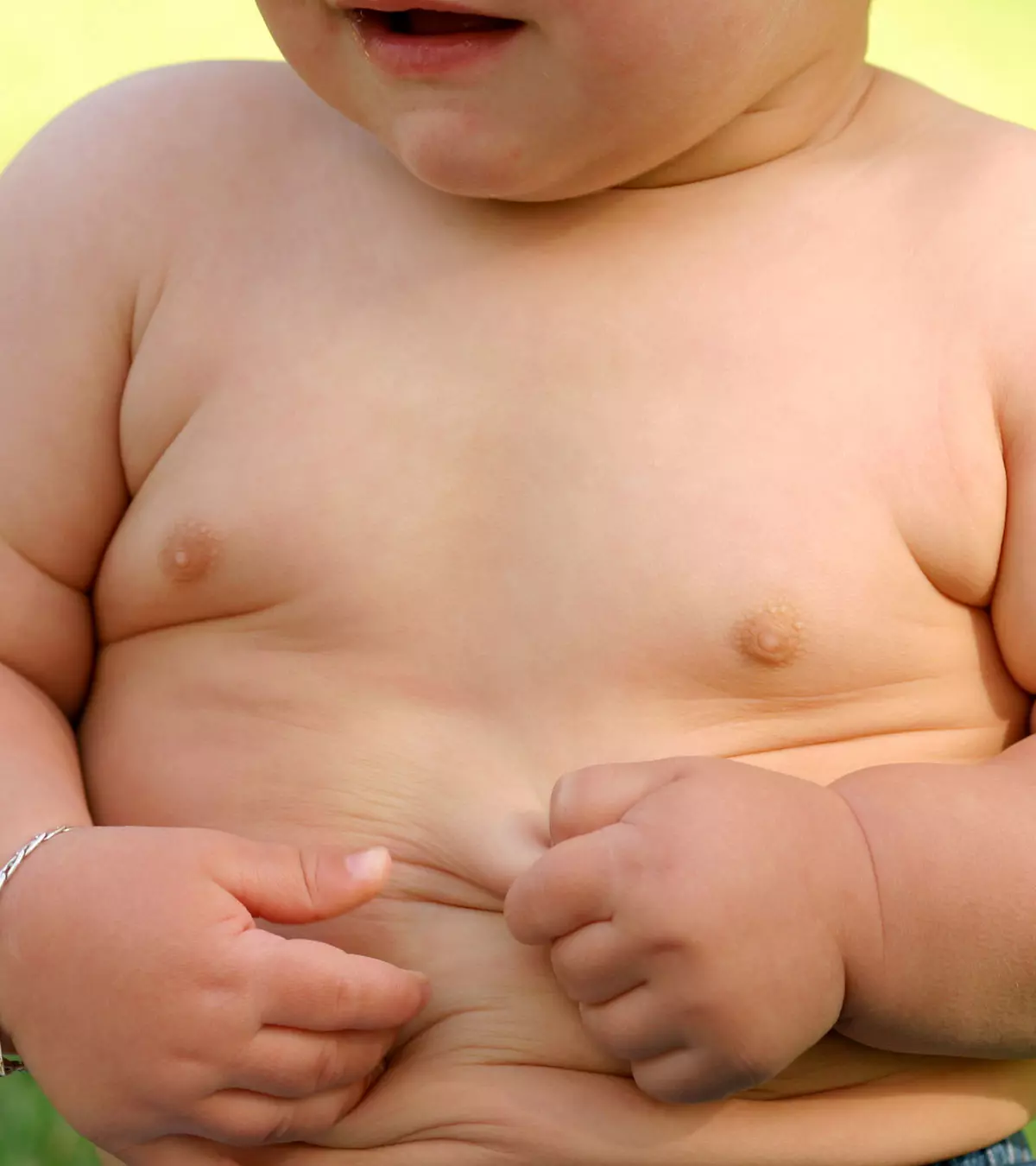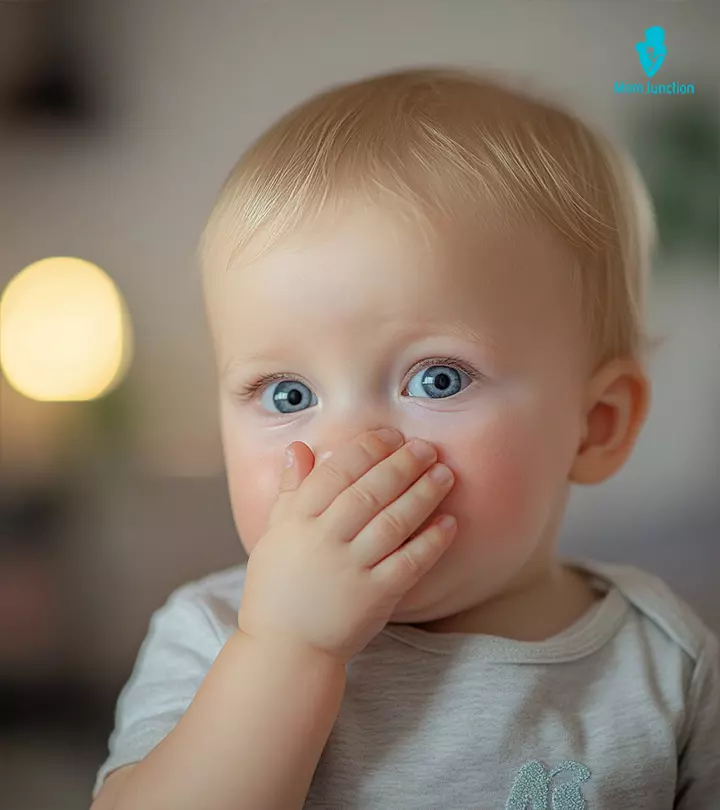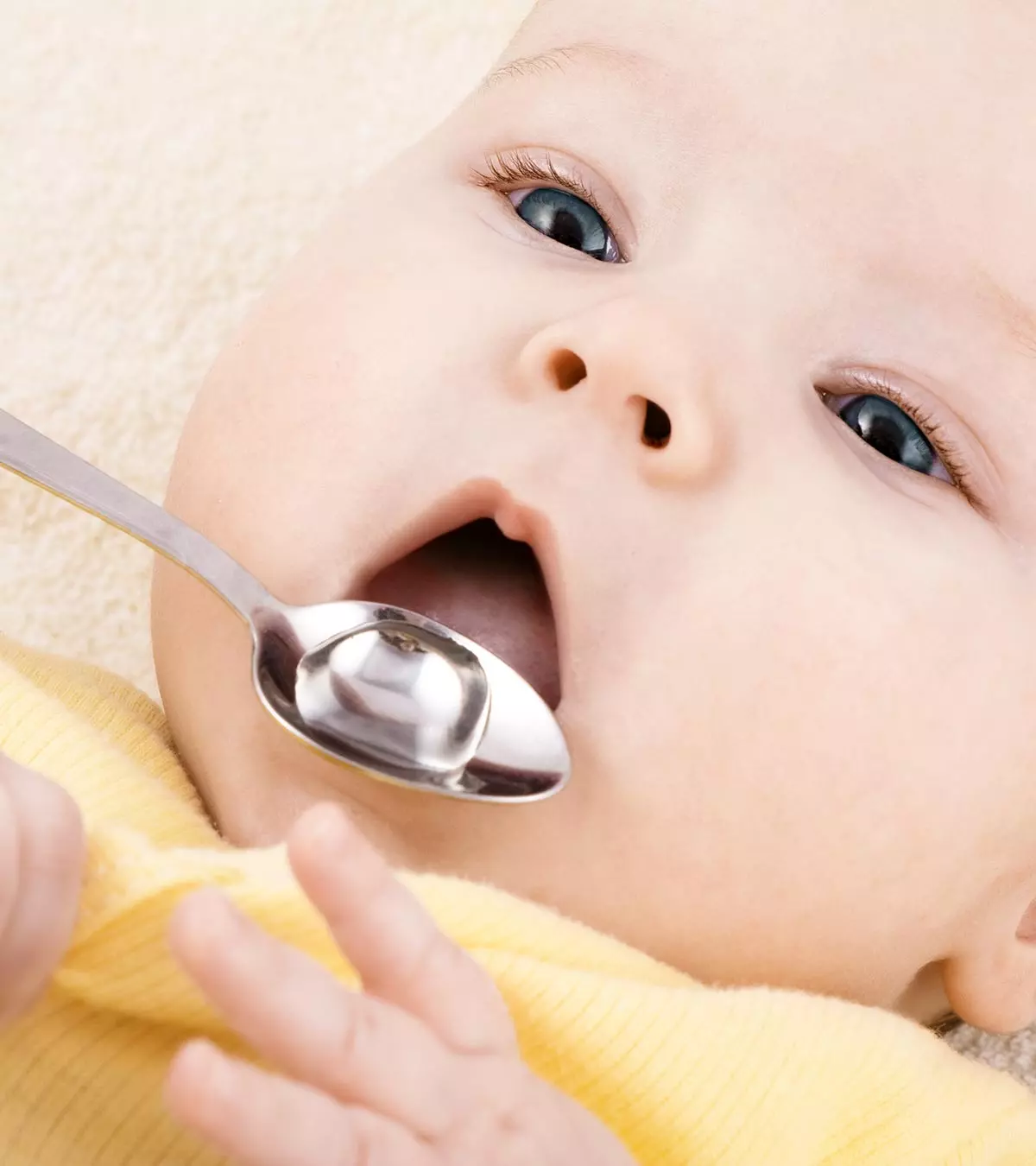
Image: Shutterstock
Peppermint is a medicinal herb known for its many health benefits and is available in different forms. It is safe to use peppermint water for babies when offered in the right amount. Mix the herb or peppermint oil in water and feed your baby a diluted version to alleviate the symptoms of different digestive problems.
This herbal home remedy has several healing properties and can help reduce gas-related heartburns and cool the stomach.
Read on to know more about the use of peppermint water for your little one, including its benefits and things to consider while using it.
Key Pointers
- Peppermint water is a safe and effective remedy for digestive problems in babies.
- Methanol in peppermint water has antispasmodic effects that can relieve stomach aches and bloating in babies.
- Peppermint water is also known to cure various stomach disorders in babies, including irritable bowel syndrome.
- It is important to consult a doctor before using peppermint water on babies, and to use the correct amount to avoid overdosing.
More About Peppermint Water For Babies

Image: Shutterstock
A single cup of peppermint water produces antispasmodic effects in the body. It can bring instant relief from extreme gas pain, infant reflux and heartburn. The leaves of peppermint contain methanol, which has a coolant effect. Methanol accelerates the flow of bile secretion and digestive juices in your baby’s body. Thus, the effect of the menthol present in the soothing beverage fights against stomach ache, soothes the irritated stomach muscles, reduces gas, colic and bloating in your baby.
Peppermint Water To Soothe Gas Pains In Babies

Image: Shutterstock
Are you wondering if you should consider peppermint water for your infant with colic? The health of your baby could be compromised by the buildup of gas that can be extremely painful and cause discomfort to your baby. Your angel may experience severe abdominal pain, flatulence, or feel bloated. Doctors may prescribe certain medications to minimize the extreme tummy ache. But there are certain herbs to cure the gas pains.
Peppermint water can be used as a home remedy, as it has a soothing effect on gas pains in babies. You can add a few fresh peppermint leaves to a cup of boiling water and then strain the solution. Let the peppermint water cool. Taste the solution first. If it is bitter or even minimally strong for your throat (makes you gag, or cough, or opens your nasal passages), it is too concentrated. Dilute the solution with more water. Offer a small amount, around half to one teaspoon of the cold peppermint solution. If the solution brings instant relief from pain, and your baby may recover from the extreme stomach ache.
But it is always recommended to consult with your physician before feeding your baby such herbal solutions.
 Expert says
Expert saysPeppermint Water To Treat Stomach Disorders In Babies

Image: Shutterstock
A small amount of peppermint water, nearly one or two drops is easy for your baby to ingest and is a calming drink. As the solution has antibacterial properties, it produces a numbing and calming effect that cools the upset infant stomach.
Infant wellness can be promoted by burping which provides relief from the build-up of gas. Some other natural remedies to soothe stomach disorders include using gripe water for babies, placing a warm cloth to the belly while massaging, swaddling them and gently rocking them, and calming them white noise. A warm bath can soothe the baby’s abdominal muscles, providing gastrointestinal relief.
 Quick tip
Quick tipPeppermint Water To Treat Irritable Bowel Syndrome In Babies
Peppermint water is an ancient herbal natural remedy to cure stomach ailments including irritable bowel syndrome. The diluted solution helps attain a healthy digestive system. It enhances bile flow leading to improved digestive health and healthy bowel activity in your baby’s system. Peppermint acts as a calming agent and relaxes the stomach and intestinal muscles and reduces stomach cramping.
Using A Peppermint Diffuser Near An Infant
To ensure the safety of babies and toddlers under 30 months old, it is not recommended to diffuse pure peppermint oil around them. Experts advise avoiding peppermint oil in this age group to prevent potential health risks, such as seizures (3).
High concentrations of menthol from peppermint oil can cause symptoms such as dizziness, confusion, muscle weakness, nausea, and double vision. These symptoms can be particularly harmful to young children. If you intend to use peppermint oil around children over 30 months old, it should be done cautiously in a well-ventilated room. You may utilize professional blends specifically formulated for children with small amounts of peppermint oil (4).
Points To Remember
- If your baby’s age is below five years, prevent an overdose of peppermint water. The methanol contained in the peppermint water can induce a risk of choking in your baby.
- Pure peppermint oil can be dangerous to infants or small babies if applied directly to their skin. So, avoid direct application of peppermint oil to your baby’s face or other body parts.
- If your infant suffers from colic, remember it is a short period of their life even if it seems like an eternity. Speak with your physician to see if there is an underlying issue and get your patience going.
Frequently Asked Questions
1. Can I give peppermint tea to babies?
Peppermint tea may cause a burning sensation in the mouth. Hence, experts recommend against feeding it to babies (5).
2. Can I give babies peppermint candy?
Experts mention round, hard, and sticky/gooey candies as potential choking hazards for children younger than four years (6). Thus, you should never give peppermint candy to your baby or toddler.
3. Is it safe for babies to inhale peppermint oil?
Babies should not inhale undiluted peppermint oil as it is not safe for infants. Inhalation of menthol (the active agent in peppermint oil) in excess may lead to dizziness, nausea, and muscle weakness. Hence, experts recommend using diffuser blends containing minor percentages of peppermint oil in a well-ventilated room for the suggested duration only (3).
4. Can babies have peppermint oil for teething?
According to Dr. Laila Kaikavoosi, a UK-based general practitioner and hormone specialist, “Peppermint oil contains menthol, which can be too strong for infants and may lead to adverse reactions. Instead of peppermint oil, I recommend safer alternatives such as chilled teething rings or gentle massages to alleviate discomfort.”
Because of its several healing and antibacterial properties, Peppermint water for babies is considered an effective herbal home remedy to soothe gas-related heartburns and stomach cooling. Add a few fresh peppermint leaves in a cup of boiling water, strain the solution, and cool it. Also, keep tasting while preparing, and if it’s too bitter, dilute it with more water before giving it to your little one.
Infographic: Health Benefits Of Peppermint For Babies
Parents need to ensure their infants are keeping healthy. Peppermint is an essential oil that they use to treat various health issues. Read this infographic to explore the multiple health benefits of using peppermint water for babies. Consult your child’s pediatrician if you notice any allergies. Illustration: Momjunction Design Team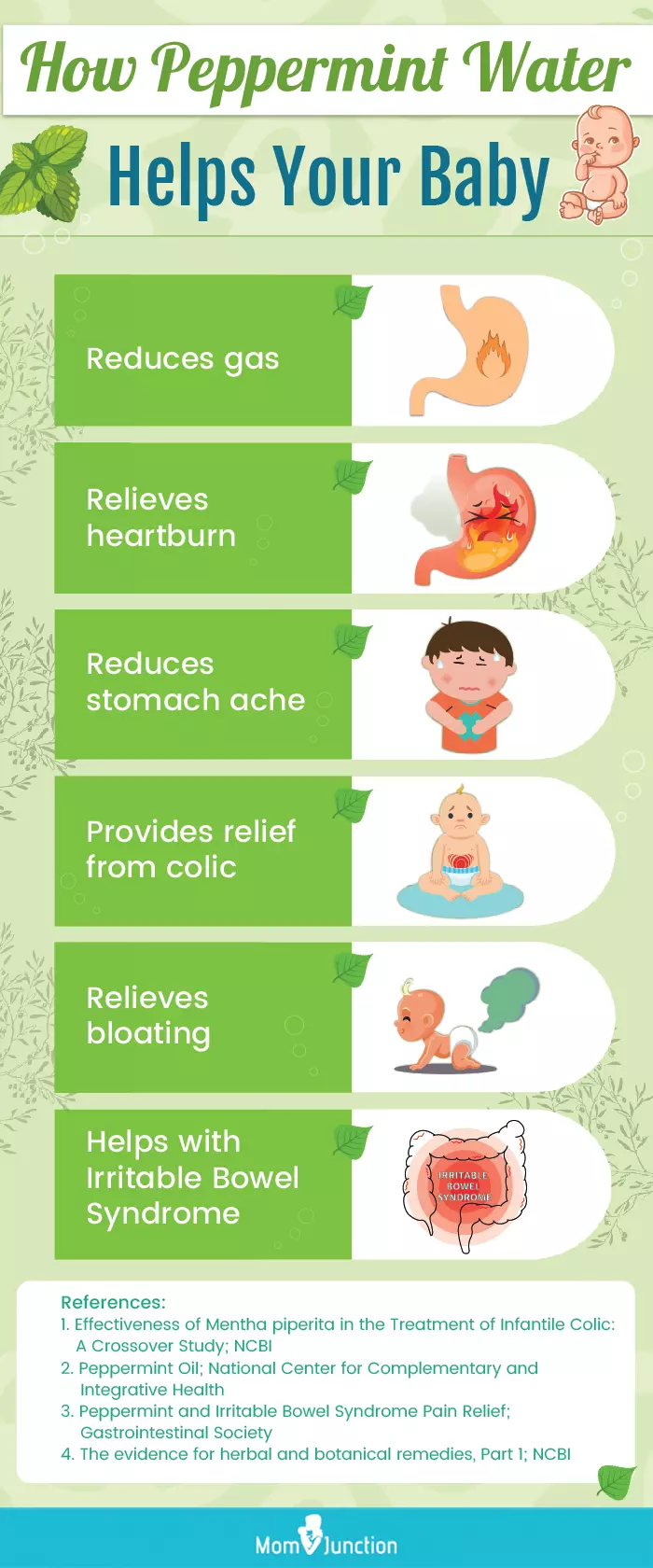
Illustration: Peppermint Water For Babies – Everything You Need To Know

Image: Dall·E/MomJunction Design Team
References
- Don’t Give Herbal Supplements to Infants.
https://www.poison.org/articles/dont-give-herbal-supplements-to-infants - Colic Relief Tips for Parents.
https://www.healthychildren.org/English/ages-stages/baby/crying-colic/Pages/Colic.aspx - NAHA Safety Note for Peppermint (Mentha x piperita) Essential Oil
https://naha.org/naha-blog/peppermint-safety-info/ - Are Essential Oils Safe for Children?
https://www.hopkinsmedicine.org/health/wellness-and-prevention/are-essential-oils-safe-for-children - Peppermint.
https://www.mountsinai.org/health-library/herb/peppermint - Choking Hazard Safety.
https://www.nationwidechildrens.org/family-resources-education/health-wellness-and-safety-resources
Community Experiences
Join the conversation and become a part of our nurturing community! Share your stories, experiences, and insights to connect with fellow parents.
Read full bio of Dr. Tashawna Stokes
- Dr. Laila Kaikavoosi graduated from King's College London Medical School in 1999. She completed her General Practice training in London and gained membership in the Royal College of General Practitioners in 2007. Dr. Kaikavoosi is a Diplomat of the Faculty of Reproductive and Sexual Health. She practiced and trained in teaching hospitals in the UK and USA.
 Dr. Laila Kaikavoosi graduated from King's College London Medical School in 1999. She completed her General Practice training in London and gained membership in the Royal College of General Practitioners in 2007. Dr. Kaikavoosi is a Diplomat of the Faculty of Reproductive and Sexual Health. She practiced and trained in teaching hospitals in the UK and USA.
Dr. Laila Kaikavoosi graduated from King's College London Medical School in 1999. She completed her General Practice training in London and gained membership in the Royal College of General Practitioners in 2007. Dr. Kaikavoosi is a Diplomat of the Faculty of Reproductive and Sexual Health. She practiced and trained in teaching hospitals in the UK and USA.
Read full bio of Jessica Albert
Read full bio of Swati Patwal
Read full bio of Vidya Tadapatri










